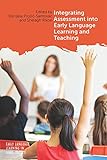Integrating Assessment into Early Language Learning and Teaching / ed. by Danijela Proši-Santovac, Shelagh Rixon.
Material type: TextSeries: Early Language Learning in School ContextsPublisher: Bristol ; Blue Ridge Summit : Multilingual Matters, [2019]Copyright date: ©2019Description: 1 online resourceContent type:
TextSeries: Early Language Learning in School ContextsPublisher: Bristol ; Blue Ridge Summit : Multilingual Matters, [2019]Copyright date: ©2019Description: 1 online resourceContent type: - 9781788924818
- 9781788924825
- 372.6 23
- LB1139.5.L35
- LB1139.5.L35 I67 2019
- online - DeGruyter
- Issued also in print.
| Item type | Current library | Call number | URL | Status | Notes | Barcode | |
|---|---|---|---|---|---|---|---|
 eBook
eBook
|
Biblioteca "Angelicum" Pont. Univ. S.Tommaso d'Aquino Nuvola online | online - DeGruyter (Browse shelf(Opens below)) | Online access | Not for loan (Accesso limitato) | Accesso per gli utenti autorizzati / Access for authorized users | (dgr)9781788924825 |
Frontmatter -- Contents -- Figures and Tables -- Key Abbreviations -- Contributors -- 1. Introduction: Assessment and Early Language Learning -- Part 1: Why Testing Is Not Enough -- 2. Affect and Assessment in Teaching L2 to Young Learners -- 3. Towards Developmentally Appropriate Assessment of Learning in a Young Learner Classroom -- 4. Integrating Developmentally Appropriate Assessment with Instruction in the Young Learner Classroom -- 5. We Scare Because We Care: Young Learners and Test Anxiety -- Part 2: Integrating Assessment into Learning and Teaching: Approaches -- 6. Assessment for Learning with Younger Learners: Is Thinking about Their Learning a Step Too Far? -- 7. Exploring Roles for Formative Assessment in Primary FL Classrooms: Looking Through a Primary FL Classroom Window -- 8. Collaborative Approaches to Assessing Progression in English in an Early Language Learning Initiative: A Case Study -- 9. Opportunities for Formative Assessment in the Storyline Approach -- Part 3: Integrating Assessment into Learning and Teaching: Tools -- 10. Role Plays: A Versatile Tool for Assessing Young Learners -- 11. Assessment of Very Young Learners of English and the Joy of Puppetry: A Multiple Case Study -- 12. Elicited Imitation: Potential for Integrated Teaching and Assessment -- 13. Assessing the Vocabulary Knowledge of Preschool Language Learners -- Part 4: From Policy to Practice Through Professional Development -- 14. Developing Assessment Practices for Young Learner English Teachers: A Professional Development Model in Peru -- 15. Assessment Policy and Practices of Early Language Learning in Iceland -- 16. Assessing Young English Language Learners in Serbia: Teachers' Attitudes and Practices -- Index
restricted access online access with authorization star
http://purl.org/coar/access_right/c_16ec
The volume unites research and practice on integrating language learning, teaching and assessment at preschool and early school age. It includes chapters written by experts in the field who have studied some of the very youngest (pre-primary) children through to those up to the age of 12, in a variety of private and state contexts across Europe. The collection makes a much-needed contribution to the subject of appropriate assessment for children with the focus of many chapters being classroom-based assessment, particularly formative assessment, or the case for developing assessment skills in relation to even the youngest children. As a whole, the book provides useful case study insights for policymakers, teacher educators, researchers and postgraduate students with interest in or responsibility for how children are assessed in their language learning. It also provides practical ideas for practitioners who wish to implement greater integration of assessment and learning in their own contexts.
Issued also in print.
Mode of access: Internet via World Wide Web.
In English.
Description based on online resource; title from PDF title page (publisher's Web site, viewed 24. Apr 2022)


